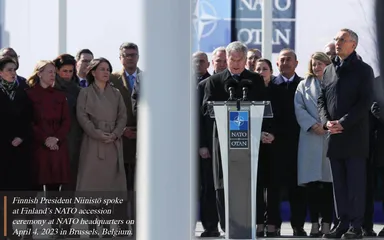The International Security Situation in 2023: Seeking Order Change and Reshaping Amidst Turbulence and Uncertainty
作者: Tang Yongsheng

Continued Tensions in Relations Among the major countries
In 2023, the international and regional security situation underwent complex and profound changes, with security threats continuing to diversify and the use of force to settle disputes increasing. Conflicts and disputes in Eastern Europe, the Middle East, Africa and other regions are recurring and difficult to quell, and instability and uncertainty on a global scale have increased. Relations among major countries continue to be tense due to factors such as the regional turmoil and intensification of strategic competition among major countries by the United States. In its National Security Strategy released in 2022, the Biden administration characterized China as “the only competitor with both strategic intent and a growing capacity to reshape the international order”, and in its National Defense Strategy released that year, it further positioned China as “the most important strategic competitor”. The U.S. defense budget reached $857.9 billion in fiscal year 2023, and it is expected to increase to $886 billion in 2024, with the Biden administration and Congress agreeing to continue to raise the defense budget. The U.S. national security strategy makes clear decisions to curb the development of competitors through investment, alliances and competition. It will undoubtedly deteriorate the international security situation, stimulate other countries to increase military spending, and even the existence of a huge risk of triggering arms race.
Since 2009, the U.S. has suspended the implementation of some provisions of the Comprehensive Nuclear-Test-Ban Treaty (CTBT). On November 2, 2023, Russian President Vladimir Putin signed a decree formally withdrawing his ratification of the CTBT, and thus the U.S.-Russian issue surrounding the ban on nuclear testing entering a new round of games. On November 7, 2023, Russia withdrew from the Treaty on Conventional Armed Forces in Europe (CFE), and the U.S. and NATO subsequently announced a suspension of their participation in the CFE Treaty. Although the actual impact of the above initiatives still needs to be tracked and assessed, there is no doubt that the international arms control system is under risk. There should be necessary rules and treaties among major countries to maintain stable relations, and relying too much on deterrence is not a foolproof option and will bring damage to global strategic stability.
NATO’s relationship with Russia continues to be tense, especially after NATO absorbed Finland in 2023. The United States signed defense agreements with Sweden and Finland, accelerated military cooperation with Nordic countries and NATO allies, stepped up strategic deployment in the Arctic region, and made great efforts to exaggerate the major countries rivalry in order to compete for polar resources and strategic advantages. In addition, starting from November 2023, Finland will gradually close all its border crossings with Russia, a decision that not only caters to the needs of the United States, but also show intentions of geopolitical competition which further isolated Russia. After Finland’s above decision, both Norway and Estonia have stated that they are closely monitoring the situation in Finland and do not rule out the closure of border crossings with Russia as well. In fact, after the outbreak of the Ukraine crisis, Russia’s bilateral relations with most of the EU and NATO countries, including the Baltic states, have fallen to their lowest point since the end of the Cold War.
The Biden administration has actively strengthened relations with its allies, downplaying differences while emphasizing common interests, but the U.S. and its allies still have problems of poorly-defined responsibilities and uneven distribution of benefits. The use of alliances is a means for the United States to achieve its own goals, but its capriciousness makes it difficult for the allies to maintain lasting and sufficient confidence in U.S. commitments. Although policy coordination and operational cooperation between the U.S. and Europe will continue under the stimulus of the Ukraine crisis, the inherent contradictions between the two sides in terms of the distribution of defense responsibilities and major concerns have not been eliminated. The more protracted the Ukraine crisis, the more European countries would come to realize that following the United States does not fundamentally solve their own security concerns, and a byproduct of supporting Ukraine and sanctioning Russia is that Europe must pay a heavier price. The diversification of interests and needs will lead to more disputes within the alliance, which is also the main manifestation of the alliance’s predicament.
In 2023, the U.S. continued to promote the Indo-Pacific Strategy, emphasizing the integrated use of military and non-military means, mobilizing its own forces and those of its allies, and creating integrated deterrence and greater strategic advantage. On August 23, the leaders of the United States, Japan and South Korea met at Camp David and subsequently issued the Camp David Principles, the Consultation Pact, and the Spirit of Camp David: U.S.-Japan-South Korea Joint Statement, emphasizing that the United States, Japan and the Republic of Korea “need to be united and coordinate their actions” at the turning point in history, such as geostrategic rivalry, the climate crisis, the situation in Ukraine, and the test of nuclear provocations. Recently, some European countries have become increasingly involved in Asia-Pacific affairs. On December 14, 2023, the United Kingdom, Italy, and Japan signed an agreement on the joint development of the next-generation stealth fighter, combining the British-led Storm fighter program with Japan’s F-X fighter program to develop a sixth-generation fighter. In view of the rising concern of the United States about the Indo-Pacific region, especially China, it has become an important move for extra-territorial countries such as the United Kingdom to demonstrate their presence in this region.